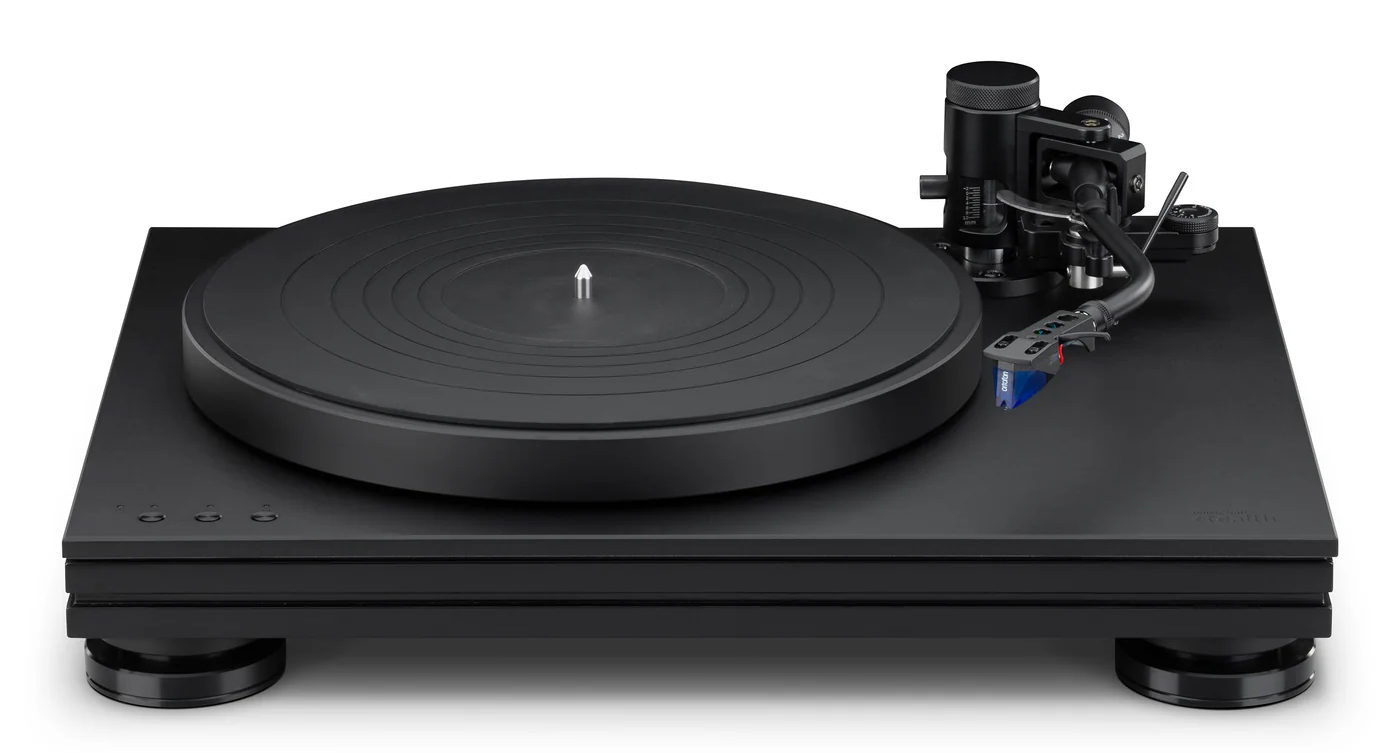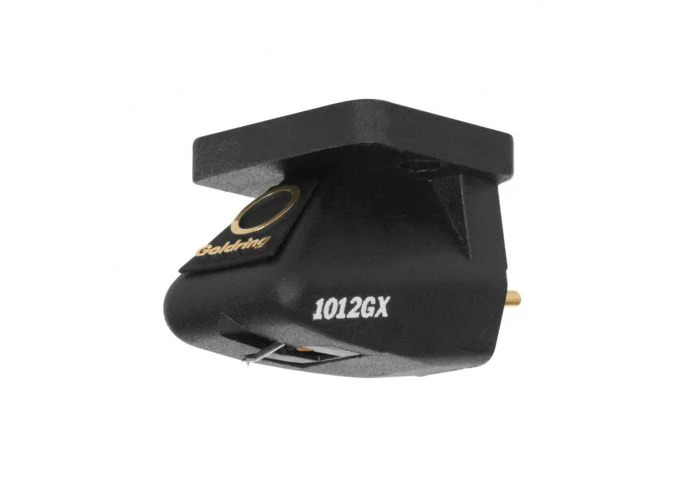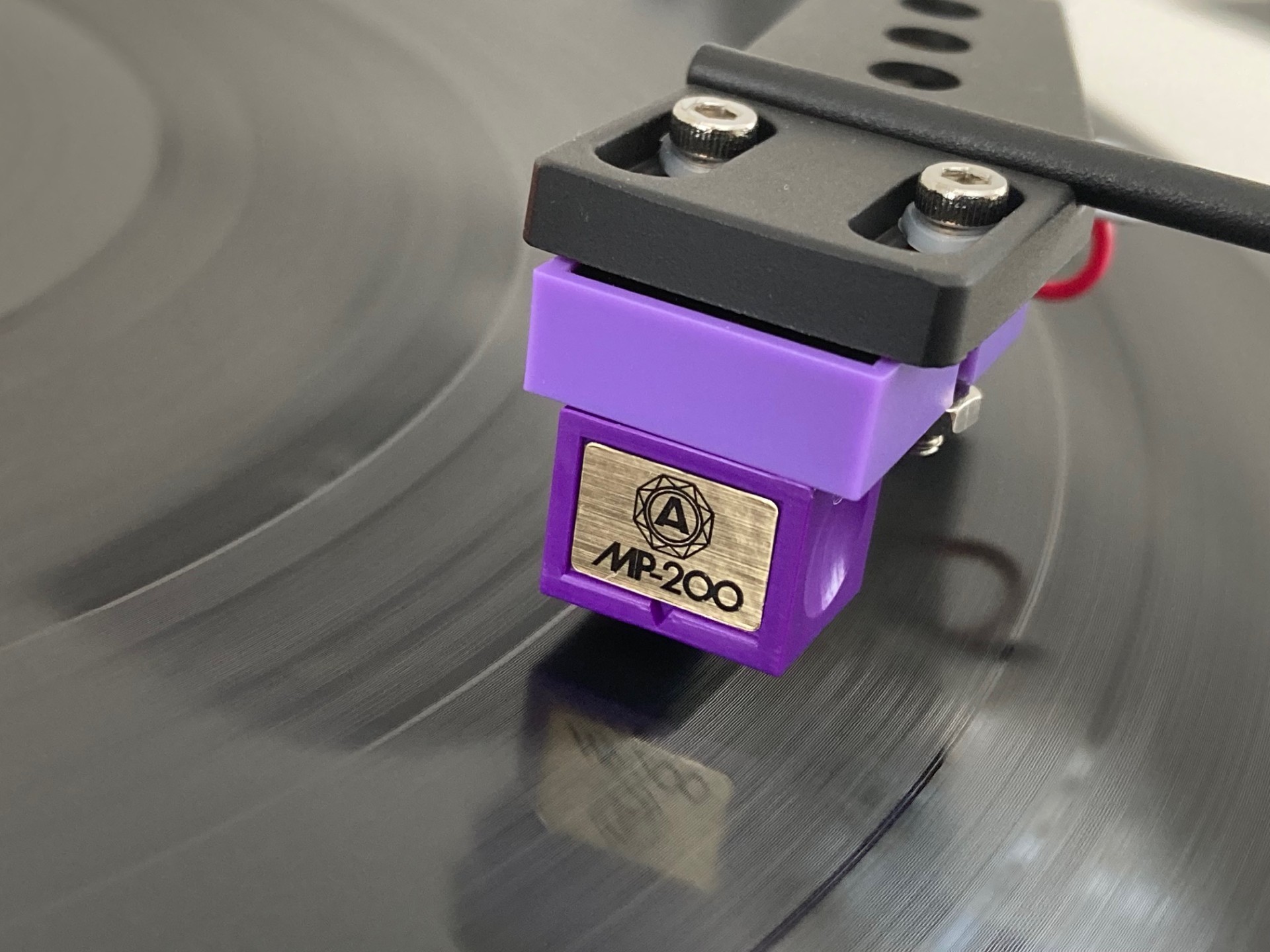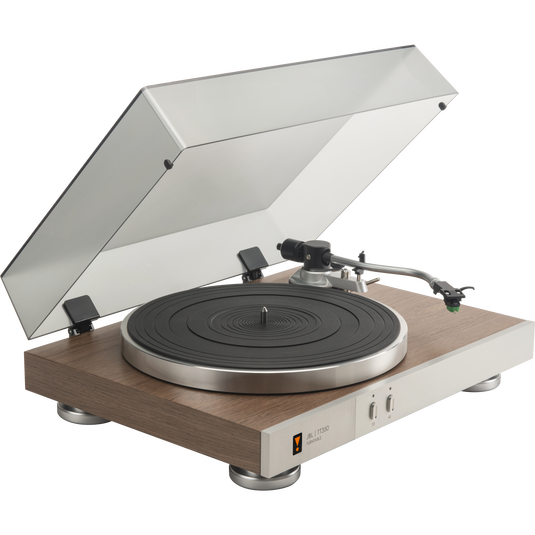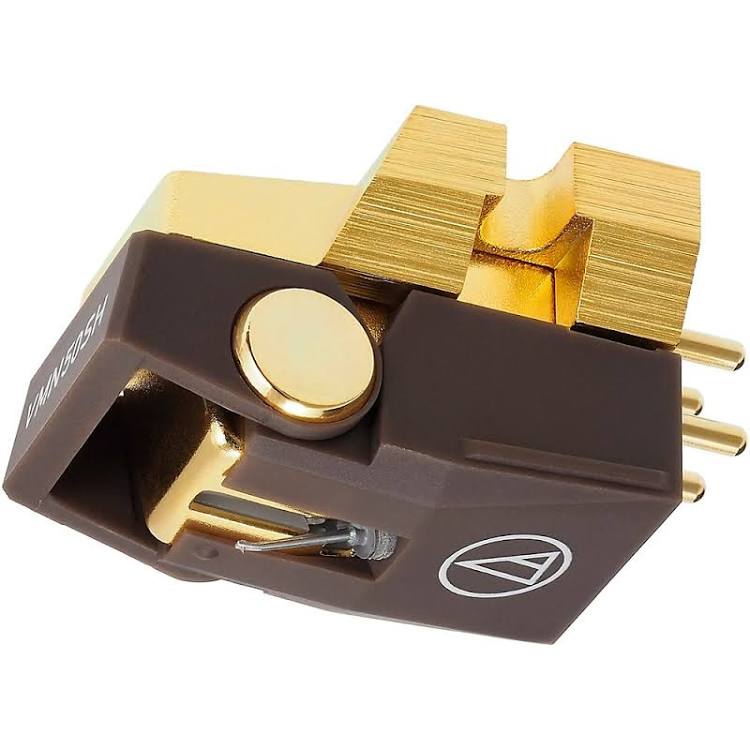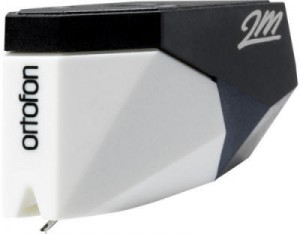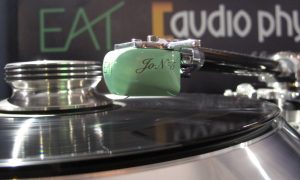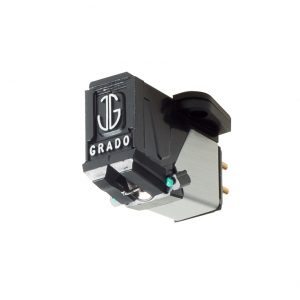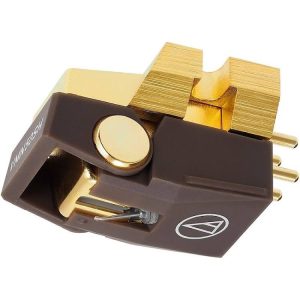Would it be damning this cartridge with faint praise to simply call it nice? I hope not, because that's precisely what the entry-level model from Mobile Fidelity Electronics is. That's not to say inoffensive, as in competent but not particularly inspiring. The StudioTracker is, in fact, fairly sophisticated and affable for such an inexpensive example of the analog arts. Priced at an inflation-friendly $199, it rarely puts a foot wrong and is especially, well, nice to settle in with for the long haul.
Mobile Fidelity's lineup starts here but rises sharply in price with the $499 UltraTracker and $799 MasterTracker, both of which trade the StudioTracker's plastic body for metal and sport more sophisticated styli. They also have the added benefit of threaded screw inserts for attaching the cartridge to your headshell, rather than the StudioTracker's fiddly nuts and bolts. At the top of the range sits the UltraGold, which is something else entirely, a $1495, low-output moving coil.
Aside from its stylish aesthetics, the StudioTracker is a conventional moving magnet design with one notable exception: the Mobile Fidelity lineup is unique in having been designed without the typical user-replaceable stylus unit. This is almost unheard of when it comes to even costly moving magnet cartridges, and only Rega goes the same route at this price point. While it's inconvenient for users to replace the complete cartridge when the stylus is worn, there are obvious (though at this price point, debatable) advantages to having seemingly unbroken electrical and physical connections throughout the entire cartridge.
Mobile Fidelity says the StudioTracker "features two powerful low-mass magnets aligned in a V formation that parallel the way a record's grooves are cut by the studio engineers." This sounds suspiciously like Audio-Technica's design philosophy, and hints at who might actually be manufacturing this thing, since I doubt MoFi has a cartridge workbench at their Michigan factory. If it is an Audio-Technica product, this isn't a simple case of badge engineering, i.e. merely slapping a different logo on someone else's product. The StudioTracker is far more customized than any other similarly sourced product I've yet seen and was clearly tailored to MoFi's specific criteria. It has no recognizable parallel in the Audio-Technica catalog.
Mobile Fidelity goes on to say that the "StudioTracker's elliptical stylus allows it to dig deep into record grooves to extract the hidden cues located within, all without adding coloration. A proprietary material is applied inside the specially designed polymer headshell to maximize performance. The exciting result: An entry-level high-end cartridge on par with much more expensive models—and an instrument that achieves wondrous channel separation, detail retrieval, and dynamic responsiveness."
Yet the actual published specifications are frustratingly vague. Perhaps this is intentional, lest the StudioTracker be judged solely by its admittedly modest numbers. That's a shame when it comes to the stylus. While being described only as elliptical, under magnification it appears to be a finer than expected .3 x .7 unit bonded to a thin and nimble cantilever.
Impedance is the usual 47K ohms, but suggested capacitance is 100pF, which if taken at face value is virtually impossible to achieve in the real world. Most MM phono preamps start there, and when you add in a typical phono cable's inherent capacitance, you quickly arrive at 200pF or so. I think what Mobile Fidelity means to suggest is that your phono preamp's preferred setting is 100pF. This makes sense for simplicity's sake in the case of inexperienced buyers, but leaves plenty of room for confusion and second guessing among more seasoned users. My guess is that a total capacitance of around 200pF, give or take, is ideal. No specific tracking angle is recommended, and allowable tracking force ranges from 1.8 to 2.2 grams with 2.0 specified in the manual.
The cartridge's lack of square sides makes lining it up a little tricky, but I aligned to the cantilever, which is fairly visible. Similarly, the old-fashioned nuts and bolts arrangement that even sub-$40 Audio-Technica models now eschew makes mounting a little trickier than necessary. This would be less of a concern if the stylus unit were user replaceable, but considering an entirely new cartridge will need to be mounted when the unit reaches the end of its life, it's a process that folks who only change cartridges when necessary won't look forward to.
Yet this is such a nice sounding model that none of those quibbles are deal breakers. In fact, it sounds a little more like budget moving coils than many moving magnets. There's an all-of-a-piece quality to the way it reproduces music that belies its otherwise ordinary bullet points. The bass is a little generous and slightly smeared along the edges, reminiscent of old Linn LP12s before the Valhalla power supply came along and tightened things up. Treble is a bit polite as well, exhibiting not so much a distracting lack of extension, but rather, a sanding off of residual roughness at the expense of some airiness. Those, in fact, may in fact be keys to its niceness. The StudioTracker otherwise digs a lot of information from the grooves.
Textures are especially well portrayed, with real aliveness and a notable lack of grain. Vocals have a compelling humanity and warmth that other inexpensive cartridges gloss over or fail to completely resolve. The StudioTracker may not kick you in the gut like a Dynavector 10x5 when it comes to drum hits or trumpet blasts, but it's not too far behind, and it won't slow down the musical pace or timing of even the most determined direct drive. Speaking of which, it paired well with both the $599 Audio-Technica AT-LP1240USB XP and similar (but more HiFi oriented) $899 Reloop Turn5 players, adding a dash of upper crust style while also damping down their disco deck pretensions. It painted a more subdued, but still enjoyable, sonic picture with the $649 Music Hall Classic belt drive (HERE), ultimately being just a bit too rich for my tastes.
Compliance is another specification that Mobile Fidelity neglects to disclose. My guess is that it's on the lowish end of medium…too stiff for low mass arms, but good with mid-mass arms and even better with slightly weightier ones. That is to say, it's just about right for the times we live in. It worked better in the heavier Reloop arm, which initially surprised me. Then I remembered that most people will be buying these pre-packaged with their Mobile Fidelity turntables. A quick Google search suggested they have a reported effective arm mass of around—yikes!—30 grams. That's awfully hefty. No wonder it liked the approximately 20 gram mass of the Turn5's arm which, not for nothing, should also consider switching from ranch dressing to vinaigrette.
Around the same time of this review, I discovered the charming, $349 Cambridge Audio Alva Duo, a very smartly designed MM/MC phono preamp that balances sweetness and incisiveness. It proved to be a genuinely lovely partner for the StudioTracker, mirroring its strengths without exaggerating them. Depending on the rest of your system, that plus the StudioTracker and Audio-Technica table (together with an ultra-low capacitance phono cable, heavy headshell and HiFi platter mat) would make for a darn (ahem) nice setup at around $1300. I certainly enjoyed how it combined pace, grip, crispness and drive with a high level of long-term listenability.
It would be downright cruel to go digging for deeper criticisms of a $199 cartridge that manages to get across so much texture and detail, with such welcome forgiveness, and an ability to get down and rock despite some dad-bod bass and genteel high frequencies. The StudioTracker imbued orchestras with full-bodied, concert hall richness and reverb, and reproduced solo guitars and piano with good precision that wasn't literal or cold. And I forgot to mention the soundstage, which was quite decently expansive for a low-priced moving magnet, showing good depth and a decent spread between the speakers, if not the most precise placement of instruments and performers.
At $76 less than the Grado Opus3 (HERE), the StudioTracker is slightly more versatile and enthusiastic but not as startlingly expressive of vocals and acoustic instruments. The $169 Goldring E3, which I haven't gotten around to reviewing but should, has more pronounced high-frequency emphasis and tauter bass, with more snap. The StudioTracker has more in common with the high output version of Sumiko's $499 Blue Point No.3 than you might expect, not least of all its decidedly non-fatiguing character, though the Blue Point has much better defined bass and better integrated and defined (though similarly polite) treble; the StudioTracker would make a good cut-price alternative. I haven't played a $239 Ortofon 2M Blue in some time, but I remember it being more literal and faster.
Maybe there's something to the StudioTracker's one-piece design and integrated stylus that helps it deliver such a homogeneous presentation. Maybe the fancy body and "proprietary material…applied inside the specially designed polymer headshell" contribute something in terms of resonance reduction as well. And as for the polite highs and somewhat fat lows, those could be canny, intentional choices designed to offset the design constraints of entry-level turntables this cartridge is likely to be used with. On better record players, it means you'll be treated to less of the nastiness associated with bad recordings and pressings.
At this point, I'm dangerously close to over-examining the performance of a cartridge that costs less than a little league pizza party. I'll leave it at this then: the Mobile Fidelity StudioTracker is nice in every way you can imagine, with every kind of music you're likely to play, blatantly shortchanging almost nothing. If it's perhaps a little overly generous here and a tiny bit kind there, that's better than stingy and harsh. It's still rich and fun and highly listenable and carries a tune with the best of its competitors. For $199, it positively glows. If that's not nice, I don't know what is.
StudioTracker Cartridge
Retail: $199
MoFi Distribution
1811 W. Bryn Mawr Ave.
Chicago, IL 60660





